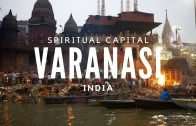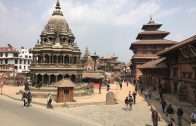Varanasi – spiritual capital of India
Experience watching the spectacle of life and death on the river and meandering through the alleys of the old city of Varanasi, also known as Banaras.
Ganga aarti is a magnificent evening ritual in Varanasi that one must not miss. The aarti, or worshipping River Ganga, takes place every day, at dusk. The ceremony is performed by a group of priests on the ghats.
Priests perform this ritual every day and special aartis are held on Tuesdays and on religious festivals. The Ganga Aarti starts soon after sunset and lasts for about 45 minutes. In summer the Aarti begins at about 7pm due to late sunsets and in winter it starts at around 6pm.

Ghats and the River Ganges
- Panchganga Ghat – the meeting of the five rivers
- Manikarnika Ghat – the main cremation ghat; a must-see, but remain quiet and never take photographs
- Dasaswamedh Ghat – known as the ‘main’ ghat, this is the site of the large evening aarti ceremony
- Rana Ghat
- Kedar Ghat – brightly painted in stripes and busy with bathers, very photogenic
- Narad Ghat – the ghat on which bathing with spouse is not advised because of the legend of contention
- Harishchandra Ghat – the cremation place where Raja Harishchandra did the last rituals of his son.
- Hanuman Ghat
- Shivala Ghat
- Tulsi Ghat – site of the large water purification plant
- Assi Ghat – a popular place to stay, with many hotels, restaurants, and internet cafes

Religious buildings
- Shri Kashi Vishwanth Temple (Golden Temple). Security is tight and sometimes completely off-limits to foreigners. No bags, cellphones or pens are allowed. They can be deposited in the shops by the temple entrance. The temple was destroyed multiple times by Mughal invaders and was re-constructed by Hindu kings who followed them.
- Sankat Mochan Temple. The famous Hanuman temple, home to thousands of monkeys. Security is tight, mobile phones, keys, etc. are not allowed inside the temple. Inside the temple, you will find stacks of hanuman Chalisa text for the use of devotees.
- Sarnath – It is believed that in Sarnath Buddha gave his first sermon to his disciples after getting enlightenment. There is also a Museum in Sarnath.

Festivals
- Chhath Pooja (October/November) – The four day festival for the sun god, Dala aka Surya. Rituals include holy bathing, fasting and abstaining from drinking water (Vratta), standing in water for long periods of time, and offering prashad (prayer offerings) and aragh (alcohol) to the setting and rising sun.
- Deepavali, or Diwali (October/November, always at new moon) – The five day festival of lights. The special decorations, ceremonies at the temples, and aarti ceremony at the ghats are spectacular.
- Maha Shivaratri (February) – A Hindu festival celebrating Lord Shiva, who lived in Varanasi according to Hindu mythology. On this day, the streets of Varanasi are filled with pilgrims and parades dedicated to Shiva occur all day. Entrance to temples will require a long queue and the temples will be extremely crowded. The day of Shivaratri is also the last day of the Dhrupad Mela, a festival of “Hindustani” (a form of Indian classical music) that goes on night and day for about 72 hours.
















